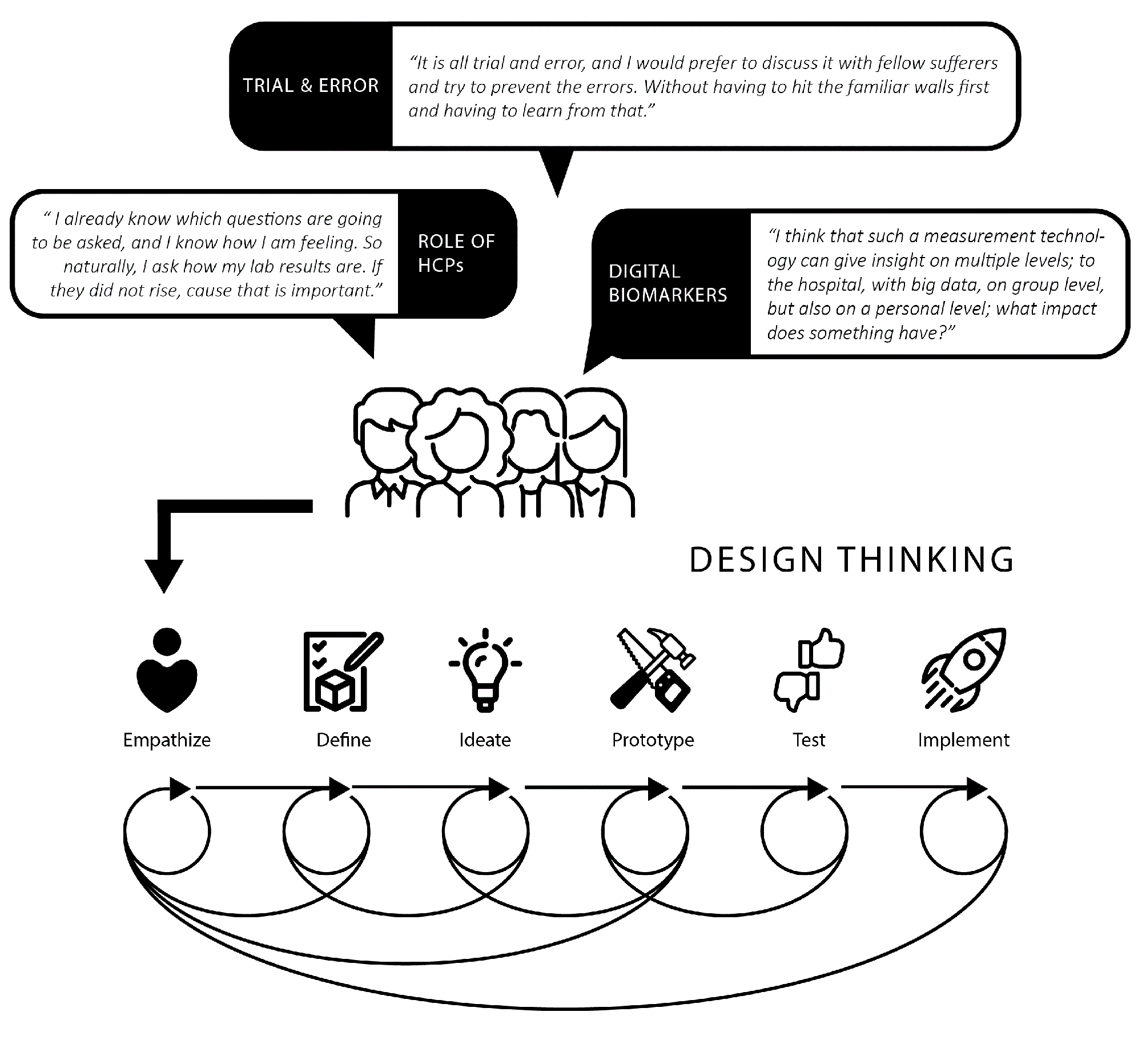Session Information
Date: Monday, November 13, 2023
Title: (1200–1220) Patient Outcomes, Preferences, & Attitudes Poster II
Session Type: Poster Session B
Session Time: 9:00AM-11:00AM
Background/Purpose: The Inflammatory Arthritis (IA) patient population is growing, whilst facing a shortage of health care professionals (HCPs). It is impossible to meet the future care demand. Digital Biomarkers (DBs) are objective, quantifiable, physiological and behavioural data that are collected and measured with digital devices. They can support continuous measurements outside the physical confines of clinical environments and help close the gap in healthcare demands.
This study aims to obtain the patients’ insights on disease activity, disease management and care needs; and to empathise with their attitude towards DBs in order to obtain future directions for DB development.
Methods: Design Thinking is followed for the development of DBs in rheumatology. It is a human-centered problem-solving approach that leverages empathy and collective idea generation to tackle complex challenges. Sixty minute online semi-structured focus group discussions, based on the Common Sense Model of Self-Regulation were conducted (Leventhal et al. 2016). All interviews were audio-recorded, transcribed to verbatim, coded and discussed with our patient partners.
Results: Six focus groups were organised, with a total of 30 IA patients (22 PsA; 8 RA, age 51± 11 years, 48% male, time since diagnosis 7 (3:12,5) years). The main findings were: Trial and error; life after diagnosis is marked by trial and error. Learning how and when to listen to their bodies, uncovering potential inflammation-triggers and developing appropriate disease management. Needs are discussions on lifestyle adjustments, career choices and life adaptations with their HCPs and fellow patients. The HCPs role; patients visited their HCP for affirmation, reflection and future directions. They often doubted whether their symptoms were rheumatic. Secondly, they wanted assurance adverse drug reactions are absent, blood tests brought peace of mind. Furthermore, consultations were indicated as obligatory self-reflection. Conversing with their HCP was seen as a reality check and a conversation about (new) options. DBs; attitudes towards DBs varied. Some patients thought it could provide them with deeper insights and reminders before crossing a line. Some patients thought it relevant only for their HCP. They did not want a constant disease reminder. Others did not see any additional value. They knew themselves well enough, no device should tell them whether their feelings are justified.
Conclusion: The following problem statement from the patients’ perspective can be formulated; “we suffer from a disease that turned our lives upside down, we have to cope with it daily. Our learning is by trial and error. We must know which activities to avoid and how to predict flares. It is difficult to discriminate ordinary pain, from pain preceding a flare. Affirmation from our HCPs and our blood results bring peace of mind. Perhaps, by applying technology, we can speed up our learning process and triggers of flare could be identified. However, one should be mindful of the purpose, the amount of notifications and the data representation.” In general there is no strong resistance to DBs. However, for future uptake the recorded data should be of clear benefit for the patient.
To cite this abstract in AMA style:
de Groot p, Tchetverikov i, Goekoop-Ruiterman Y, Olsder W, Bakker R, Kok M, Foolen J, Luime J. Discovering the Potential Application of Digital Biomarkers for Inflammatory Arthritis Patients, a Design Thinking Approach; Preliminary Results of the Patients’ Perspective [abstract]. Arthritis Rheumatol. 2023; 75 (suppl 9). https://acrabstracts.org/abstract/discovering-the-potential-application-of-digital-biomarkers-for-inflammatory-arthritis-patients-a-design-thinking-approach-preliminary-results-of-the-patients-perspective/. Accessed .« Back to ACR Convergence 2023
ACR Meeting Abstracts - https://acrabstracts.org/abstract/discovering-the-potential-application-of-digital-biomarkers-for-inflammatory-arthritis-patients-a-design-thinking-approach-preliminary-results-of-the-patients-perspective/

